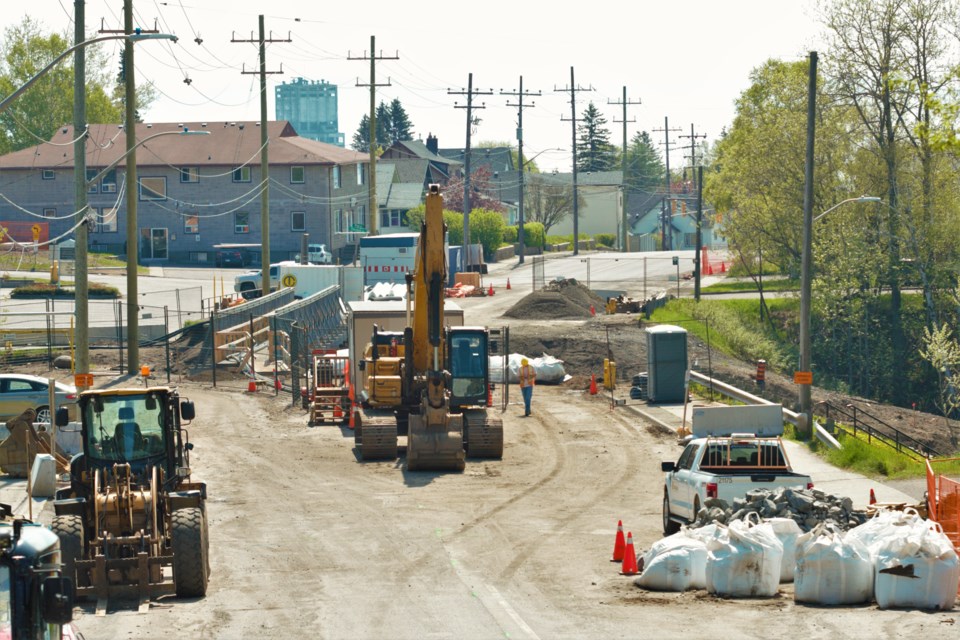THUNDER BAY — River Street will remain closed longer than initially estimated as work continues to replace a culvert that collapsed during spring flooding last year.
City staff now estimate the roadway over the culvert will be reopened to traffic by mid-July.
The city had previously aimed to reopen the street — one of Thunder Bay’s major arterial routes — by late spring, while noting that estimate would depend on weather and other factors.
Before that, city engineers had initially expressed some hope last year that with favourable conditions, the project could be completed in 2022.
One of the twin culverts, which carried the waters of McVicar Creek beneath River Street just north of Algoma Street, collapsed on May 5 of last year during spring flooding.
The culverts are set to be replaced with a single structural multi-plate metal arch mounted on concrete footings.
Mike Vogrig, a project engineer with the city, attributed the delay largely to slower progress as work proceeded through the winter season.
“Winter work just poses all sorts of problems,” he said. “I think for them to excavate the culvert on the east side and get down to the bedrock took about two months, and then to do this west side with the better weather took about two weeks.”
Crews have excavated the collapsed culvert, and are beginning to pour concrete footings for the culvert this week.
Next steps include assembling the culvert, backfilling it, replacing a sewer and water line disrupted by the work, and then proceeding to rebuild the roadway, sidewalk, curb and gutters.
Current River Coun. Andrew Foulds, who represents the area surrounding the culvert along with Red River Coun. Michael Zussino, said he shares residents’ feelings over the lengthy closure.
“I’m frustrated, and I think most of the people who contact me are also frustrated, with the situation,” he said.
“This failure of infrastructure and the length of time that it’s been out of commission has been impactful to the flow of the city — this was a major arterial.”
“Obviously it’s pushed traffic to streets that were not designed to take the kind of loads they’re supposed to. It’s been disruptive and potentially a little riskier to [nearby] neighbourhoods ... It’s also been quite inconvenient for many people.”
Still, he said there appeared to be little that could be done to move faster on a project that was both complex and unexpected.
“There have been a number of challenges that have pushed out some of the timelines,” he said. “I believe both city staff and the contractor are doing the best they can under very difficult circumstances.”
“This has proven to be a very difficult, complicated [project] dealing with not just infrastructure like roads and culverts, but also other utilities that have needed to be moved — and also the environment, because McVicar Creek is home to quite a vibrant ecosystem.”
While he said the closure has caused inconvenience for area residents and businesses, Zussino said he’s satisfied with the reopening timeline, given that major infrastructure projects typically involve years of planning.
“I think the fact they’ve repaired this in such a short period of time is pretty remarkable, given the fact this wasn’t on their agenda,” he said. “They had to engineer this, come up with a way to reroute traffic, design it all in a very short period of time.”
Both councillors said the infrastructure failure drives home the need for the city to prepare for more severe weather related to climate change.
A report produced by the city earlier this year cited the culvert collapse as one example of the risks, and costs, of climate change to municipal infrastructure.
The degree of spring flooding the city saw in 2022 “would be considered a one in a 100-year event based on ‘historic’ climate conditions,” the report stated.
City staff said the event was caused in part by record snowpacks recorded in multiple area watersheds, and followed other major flooding events in 2008, 2012, and 2016.
“I do think this highlights the urgency of dealing with vulnerable infrastructure to climate change events,” said Foulds.
“We are going to have more intense storms more often, which means there will be a higher individual assault on our infrastructure that they may or may not have been designed for, or the length of time they were supposed to survive may be in jeopardy.”
The new culvert is expected to be more resilient, with its thicker, galvanized material giving it an expected lifespan of 75 to 90 years.
The previous culvert was approaching the end of its roughly 50-year life span when it failed, Vogrig said.
Thunder Bay-based Taranis Contracting secured the contract to rebuild the culvert and roadway, with total costs estimated at $2.5 million.
After several homes in the area of the worksite experienced sewage backups last week, Vogrig said the city was not aware of any further incidents.
The sewer and water division is still looking into the source of a surge that overwhelmed two pumps at the site and caused the backups, he added.
In the meantime, he said the city has added a third pump on site.
